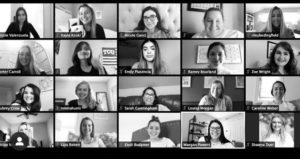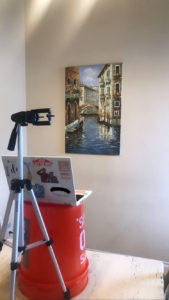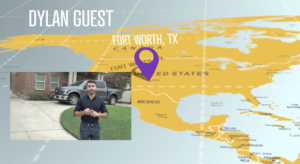Some classes offering valuable experiential learning opportunities to Schieffer College students look a little different this fall. Faculty members have altered their typical lesson plans and are thinking creatively in order to provide students with the worthwhile learning experiences their classes are known for.
Sarah Angle, a strategic communication instructor and the faculty advisor for TCU’s ad and public relations agency, Roxo, hosts Roxo class meetings on Zoom and account team meetings in person on campus. Because of the physical distancing protocols, each account team, which consists of six students, has the opportunity to use the agency room one day a week. Clients meetings are held on Zoom.
Coincidentally, students in Roxo began using Slack at the beginning of the Spring 2020 semester. “It was a saving grace,” said Angle. She said they used Zoom and Google Docs inside the Slack app and Angle said using those communication tools helped the agency become fully digital.
Angle says this new reality is teaching her students to thrive in a digital workspace. She tells them, “This is what everyone else in the world is doing right now. This is hard, but it’s preparing you for reality. You’re building resilience that will last a lifetime.”
Angle says she knows the experience of working at an agency will still be valuable. “I think we’re trying to make the best of the situation we’re in.” She says students will still get great portfolio pieces from their time working for Roxo as well as real-world experiences they can reflect upon when applying and interviewing for jobs.
Patty Zamarripa, assistant professor of professional practice in journalism, is teaching virtually throughout the fall semester. When TCU moved all in-person classes to online instruction last spring, Zamarripa said initially there was some concerns voiced by her students as they worried what they would do if they couldn’t shoot content for their news reel or record newscasts on the set. However, she said, “I learned that when the bar is raised, TCU students will meet those higher expectations every time.”
In her Advanced News Production class, Zamarripa teaches journalism students how to think on their feet and adapt — lessons future journalists need to learn now more than ever. She said, “You have to be nimble. In the real world, equipment fails, things go wrong and plans change. That doesn’t mean you just walk away. The newscast is still going to go on at its scheduled time whether you are ready or not. So you learn to work with what you have.”
In her class last semester, every student had access to a smartphone and a computer. So, she set the bar a little higher. “The result was amazing. The students produced content that was more creative, more focused and more real-world than ever before. This was exactly what people in the TV news industry were having to do, too.”
That experience has already paid off. She said, “A few short months after the pivot, students started applying for jobs, and each one of them was able to tell an interviewer, ‘I didn’t sit around during the COVID shutdown, I actually worked and produced content just like you did. Here’s my latest story.’”
In her classes this fall, Zamarripa is taking a deeper dive into how students can make remote reporting and newscasting look professional with a few critical tips and tricks. “The coronavirus pandemic is forcing journalists to think outside the box. We’re moving away from traditional reporting techniques. How we mic people up, how close we get, the lenses we use, the writing style, the editing process – it’s all changing in some form or fashion,” she says.
Additionally, she has invited some local TV news reporters to join her classes via Zoom to talk about real-world experiences they are dealing with and to give feedback on her students’ work.
For several years now, she’s included the following advice in her syllabus: “What we do does not have to be traditional. Don’t be afraid to take risks.” In such a nontraditional year, Zamarripa hopes her students are ready to venture out of the box.



